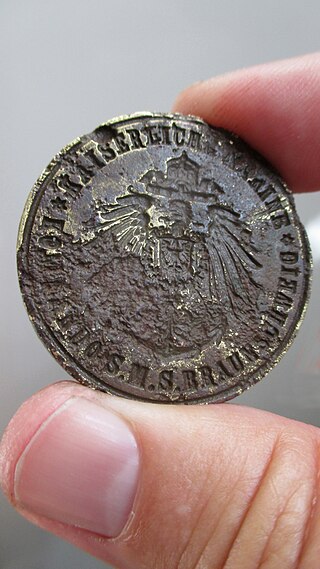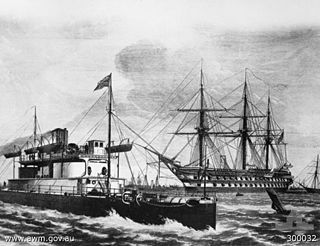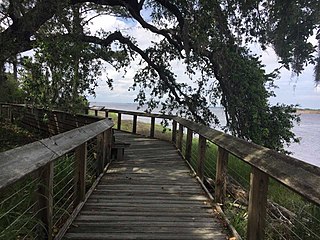The Navigation Acts, or more broadly the Acts of Trade and Navigation, were a long series of English laws that developed, promoted, and regulated English ships, shipping, trade, and commerce between other countries and with its own colonies. The laws also regulated England's fisheries and restricted foreign—including Scottish and Irish—participation in its colonial trade. While based on earlier precedents, they were first enacted in 1651 under the Commonwealth.

The Colony of Virginia was an English, later British, colonial settlement in North America that existed between 1606 and 1776.

HisMajesty's Ship, abbreviated HMS and H.M.S., is the ship prefix used for ships of the navy in some monarchies. Derived terms such as HMAS and equivalents in other languages such as SMS are used.

Triangular trade or triangle trade is trade between three ports or regions. Triangular trade usually evolves when a region has export commodities that are not required in the region from which its major imports come. It has been used to offset trade imbalances between different regions.

The Gaspee affair was a significant event in the lead-up to the American Revolution. HMS Gaspee was a Royal Navy customs schooner that enforced the Navigation Acts around Newport, Rhode Island, in 1772. It ran aground in shallow water while chasing the packet boat Hannah on June 9 near Gaspee Point in Warwick, Rhode Island. A group of men led by Abraham Whipple and John Brown I attacked, boarded, and burned the Gaspee to the waterline.

An aviso was originally a kind of dispatch boat or "advice boat", carrying orders before the development of effective remote communication.

Before Federation in 1901 five of the six separate colonies maintained their own naval forces for defence. The colonial navies were supported by the ships of the Royal Navy's Australian Station which was established in 1859. The separate colonies maintained control over their respective navies until 1 March 1901, when the Commonwealth Naval Forces was created.

The Boston Tea Party was an American political and mercantile protest on December 16, 1773, by the Sons of Liberty in Boston in colonial Massachusetts. The target was the Tea Act of May 10, 1773, which allowed the British East India Company to sell tea from China in American colonies without paying taxes apart from those imposed by the Townshend Acts. The Sons of Liberty strongly opposed the taxes in the Townshend Act as a violation of their rights. In response, the Sons of Liberty, some disguised as Native Americans, destroyed an entire shipment of tea sent by the East India Company.

Edwin Fox is one of the world's oldest surviving merchant sailing ships. The Edwin Fox is also the only surviving ship that transported convicts to Australia. She is unique in that she is the "only intact hull of a wooden deep water sailing ship built to British specifications surviving in the world outside the Falkland Islands". Edwin Fox carried settlers to both Australia and New Zealand and carried troops in the Crimean War. The ship is dry-docked at The Edwin Fox Maritime Centre at Picton in New Zealand.
Adam Baldridge was an English pirate and one of the early founders of the pirate settlements in Madagascar.

Aliens: Earth Hive is a 1992 novel by Steve Perry, set in the fictional Alien movie universe. It is an adaptation of the story "Outbreak" which was the first in the Aliens comic book series, written by Mark Verheiden.
Dirk Chivers was a Dutch pirate active in the Red Sea and Indian Ocean.

Eritrea was a colonial ship of the Italian Regia Marina constructed in the Castellammare Shipyards near Napoli. Construction started in 1935 and she was commissioned in 1937. She served mainly in the Indian and western Pacific Oceans.

Brunswick Town was a prominent town in colonial North Carolina. It was the first successful European settlement in the Cape Fear region, a major British port in the 18th century, and home to two provincial governors. Brunswick Town lasted 50 years (1726–1776) until it was raided by the British Army during the American Revolutionary War and never rebuilt. During the American Civil War, 86 years after the town was abandoned, a large portion of the town was covered by earthworks for the construction of Fort Anderson.

An unprotected cruiser was a type of naval warship in use during the early 1870s Victorian or pre-dreadnought era. The name was meant to distinguish these ships from “protected cruisers”, which had become accepted in the 1880s. A protected cruiser did not have side armor on its hull like a battleship or “armored cruiser” but had only a curved armored deck built inside the ship — like an internal turtle shell — which prevented enemy fire penetrating through the ship down into the most critical areas such as machinery, boilers, and ammunition storage. An unprotected cruiser lacked even this level of internal protection. The definitions had some gray areas, because individual ships could be built with a protective deck that did not cover more than a small area of the ship, or was so thin as to be of little value. The same was true of the side armor on some armored cruisers. An unprotected cruiser was generally cheaper and less effective than a protected cruiser, while a protected cruiser was generally cheaper and less effective than an armored cruiser, with some exceptions in each case.

West Indiaman was a general name for any merchantman sailing ship making runs from the Old World to the West Indies and the east coast of the Americas. These ships were generally strong ocean-going ships capable of handling storms in the Atlantic Ocean. The term was used to refer to vessels belonging to the Danish, Dutch, English, and French West India companies.

Shipbuilding in the American colonies was the development of the shipbuilding industry in North America, from British colonization to American independence.

Gooch's American Regiment was a Regiment of Foot recruited in British North America, and put on the British establishment. It served in the expedition to Cartagena 1741, suffering heavy losses primarily from sickness. The regiment had a poor reputation and was regarded as undisciplined. It was severely neglected by the British government, and by the British military leadership, who did not feed or pay them at the base in Jamaica, and misused them as seamen during the expedition.














